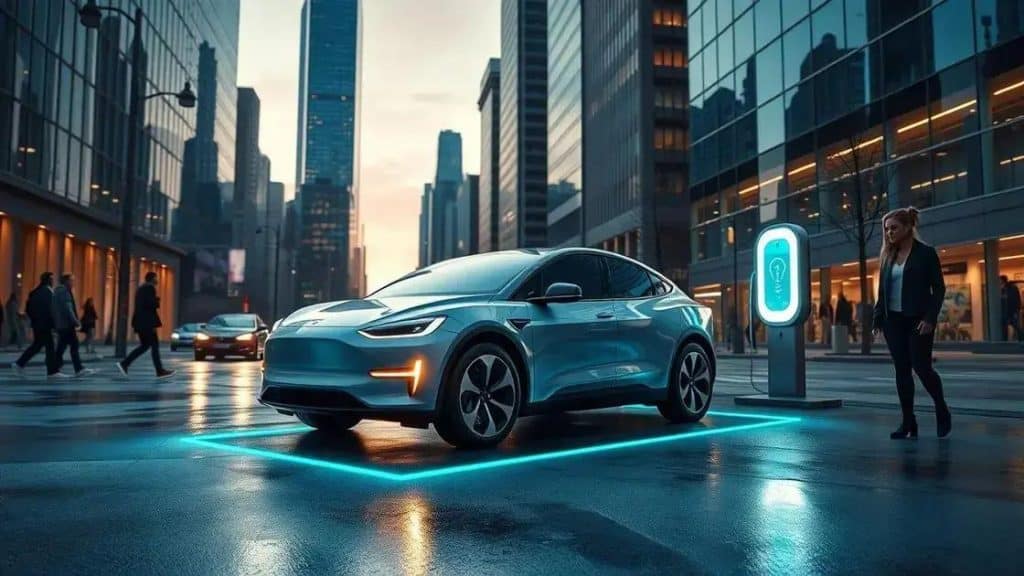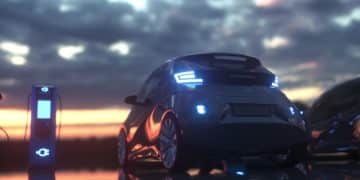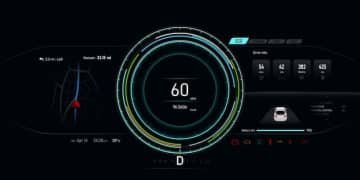Wireless charging technology for electric cars: the future

Wireless charging technology for electric cars allows seamless energy transfer without cables, offering convenience, enhanced safety, and the potential for future advancements, despite challenges like cost and efficiency.
Wireless charging technology for electric cars is gaining momentum, offering a glimpse into a future where plugging in may become obsolete. Have you ever imagined a world where your vehicle charges automatically as you park? Let’s delve into this exciting innovation.
Understanding wireless charging technology
Understanding wireless charging technology begins with grasping how this innovative system works. Unlike traditional charging methods that rely on physical connections, wireless charging uses electromagnetic fields to transfer energy between a charging pad and a vehicle. This method, often referred to as inductive charging, is revolutionizing the way we think about powering electric cars.
How Wireless Charging Functions
The process initiates when the car is parked over a charging pad. Coils in the pad generate an electromagnetic field, which is captured by coils in the car, converting the energy back into direct current (DC) electricity. This process can happen efficiently as long as the vehicle is aligned properly with the charging pad.
Key Advantages of the Technology
This technology offers numerous benefits:
- Convenience: Drivers don’t need to plug in or unplug their vehicles.
- Safety: There’s no risk of electrical shock or wear on charging ports.
- Less wear and tear: With no physical connectors, components last longer.
Additionally, wireless charging technology enhances user experience. It enables automated and seamless charging, allowing owners to simply park their cars without the hassle of cables. As electric vehicle adoption rises, the infrastructure for these charging systems is also developing rapidly, making them more accessible.
Moreover, there’s an exciting prospect for integration with smart city infrastructure. Imagine a future where wireless charging technology is not just limited to homes or public stations but incorporated into roads and parking areas. This could lead to continuous charging as vehicles move, increasing the practicality of electric cars.
As research and development continue, the efficiency of wireless charging systems is expected to improve, possibly matching that of wired systems in the near future. This means that not only could you charge without cables, but you might do so more efficiently than ever.
Benefits of wireless charging for electric cars

The benefits of wireless charging for electric cars are numerous and impactful. This innovative technology brings forth a new era of convenience and efficiency for electric vehicle (EV) owners. By eliminating the need for physical plugs, it simplifies the charging process.
Convenience and Ease of Use
Wireless charging means you can just park your car and let it charge. No more fussing with cables or connectors! This hassle-free experience enhances the overall user experience, making electric cars even more attractive to potential owners.
Enhanced Safety Features
Another significant advantage of wireless charging is safety. There are no exposed wires or connections that can wear out over time. This reduces the risk of electrical shocks or accidents, making it a safer option for all users.
- Reduced maintenance: With fewer physical components to manage, there’s less chance of wear and tear.
- Ease in adverse weather: Charging can occur in rain or snow without concern for damage.
- No need for physical interaction: Perfect for busy drivers who are always on the go.
Moreover, it aids in reducing congestion at charging stations. With wireless systems becoming more common, it’s easier for multiple vehicles to charge simultaneously without queuing or rearranging vehicles.
This technology can also be integrated into smart city planning. Imagine roads or parking spaces equipped with wireless charging pads. As people drive or park their EVs, their cars could charge continuously, making EVs more viable for long-distance travel without the worry of battery depletion.
With the growing adoption of electric vehicles, the evolution of wireless charging technology is set to make a significant impact on the automotive industry. This shift will not only enhance the user experience but also pave the way for a more sustainable future.
Challenges to widespread adoption
While the potential of wireless charging technology for electric cars is promising, several challenges hinder its widespread adoption. Addressing these issues is crucial for manufacturers and consumers alike to fully embrace this technology.
High Initial Costs
One of the primary obstacles is the high cost of implementing wireless charging infrastructure. The technology requires significant investment from both car manufacturers and charging station providers. Many consumers might be hesitant to adopt such technology until prices drop.
Efficiency Concerns
Another challenge revolves around the efficiency of energy transfer. Current systems may not be as efficient as traditional wired charging, which can result in longer charging times. For many drivers, time is a valuable resource, and waiting longer to recharge might not be an appealing option.
- Energy loss: Wireless charging usually has some energy loss during transmission.
- Longer charging time: Drivers may require faster solutions to avoid inconveniences.
- Alignment issues: Proper alignment of the vehicle with the charging pad is essential for effective charging.
Additionally, the potential for standardizing the technology is another uphill battle. Without a universal standard, different manufacturers could produce incompatible systems. This would complicate the user experience, leading to confusion and frustration among consumers.
Moreover, public awareness plays a critical role. Many potential buyers may not understand how wireless charging technology works or its benefits. Educating consumers is essential for fostering acceptance and promoting the shift towards electric vehicles with wireless capabilities.
Finally, regulatory and safety concerns also exist. Ensuring that wireless systems comply with safety standards and regulations requires comprehensive testing and oversight, which can slow development and deployment.
Future trends in electric vehicle charging solutions

Future trends in electric vehicle charging solutions promise exciting advancements that could change how we power our cars. As technology evolves, several key developments are shaping the future landscape of EV charging.
Integration with Smart Cities
One significant trend is the integration of charging infrastructure into smart cities. This means that charging stations will be designed to work seamlessly with urban planning and traffic management systems. Imagine charging points embedded in streetlights or roads, providing power as vehicles drive or park.
Ultra-Fast Charging Solutions
Another trend is the development of ultra-fast charging solutions. Manufacturers aim to reduce charging times significantly, allowing drivers to charge their vehicles in minutes rather than hours. These innovations will greatly enhance the convenience of owning an electric vehicle.
- Higher power outputs: Upcoming chargers may provide over 350 kW, making quick stops more feasible.
- Smart charging stations: These can adjust charging rates based on grid demand and energy prices.
- Wireless charging advancements: Future systems may offer improved efficiency and accessibility.
Moreover, the rise of renewable energy sources is influencing charging trends. More charging stations are being powered by solar, wind, or other renewable sources. This shift not only helps reduce carbon footprints but also aligns with the growing consumer demand for sustainable solutions.
Behavioral changes among consumers will also impact the future of electric vehicle charging. As more people become aware of the advantages of EVs, they will seek convenient, eco-friendly charging options. This increased demand will encourage innovations across the charging landscape.
Finally, more automakers are exploring the concept of vehicle-to-grid (V2G) technology. This allows electric cars to return excess energy back to the grid, providing backup power when needed. It not only benefits the energy system but offers EV owners an additional source of income.
FAQ – Frequently Asked Questions about Wireless Charging Technology for Electric Cars
What is wireless charging technology for electric cars?
Wireless charging technology utilizes electromagnetic fields to transfer energy between a charging pad and an electric vehicle, eliminating the need for cables.
What are the main benefits of wireless charging for electric vehicles?
The main benefits include convenience, safety, and enhanced user experience, as drivers can charge their vehicles effortlessly by simply parking over a charging pad.
What challenges does wireless charging face for widespread adoption?
Challenges include high initial costs, efficiency concerns, and the need for standardization across different manufacturers to ensure compatibility.
What future trends can we expect in electric vehicle charging solutions?
Future trends include integration with smart city technology, ultra-fast charging options, increased use of renewable energy, and advancements in vehicle-to-grid technologies.





